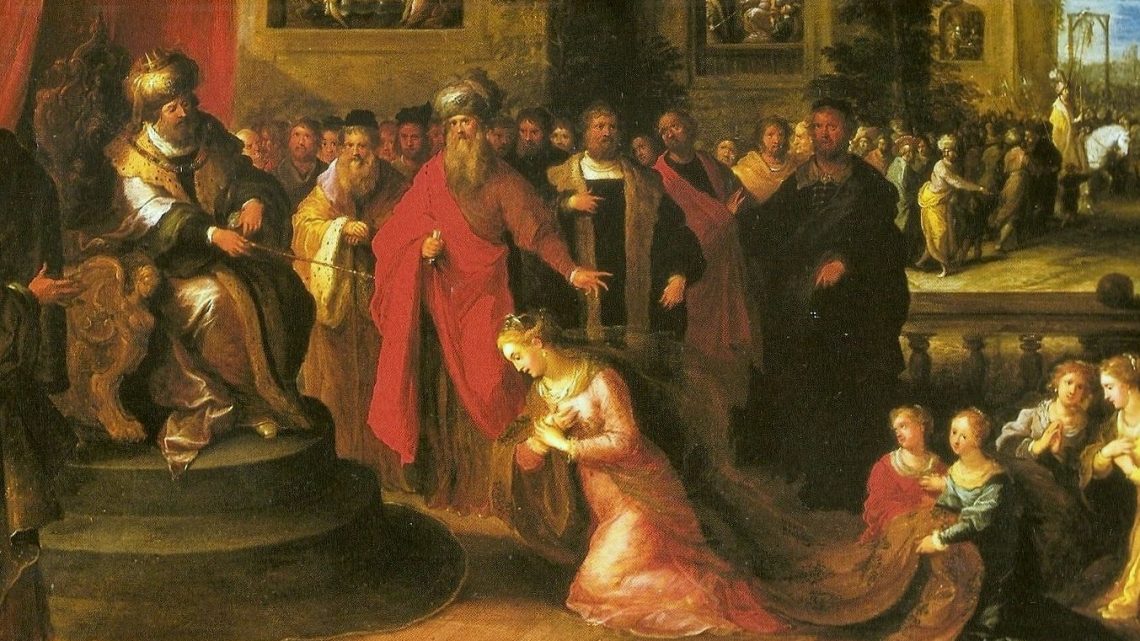“Don’t think to yourself that you will escape in the king’s house any more than all the Jews.
For if you remain silent now, then relief and deliverance will come to the Jews from another place, but you and your father’s house will perish.
Who knows if you haven’t come to the kingdom for such a time as this?”—vv.13b, 14.
If Esther had any thoughts of surviving by remaining silent, Mordecai dispels them. He knows the depth of Haman’s anger and depravity, something she likely would not have seen, given her station. Mordecai knows that Haman will not rest until the last Jew has been eliminated, so he warns her that she will not survive. But he does not limit his appeal to her basest instincts. Neither does he tell her that she is indispensable because of her rank.
We have already noted that many believed that the really devout, the “good” Jews had already departed for Judea and Jerusalem. Mordecai even counseled Esther to conceal her Jewish connection. Up to this point, we have seen no indication that Mordecai and Esther were what we would call “observant’ Jews. Yet here we have an unconditional expression of faith in God. “Deliverance will come,” Mordecai tells her. Not it might come, or it could come. No, it “will come.” Mordecai thus presents the situation not as a last resort, but as an opportunity afforded Esther because of her exalted rank as Queen; as a high calling.
We have already seen Esther’s beauty of character as well as of appearance, so her positive response to his appeal is totally in character. She will not use her protected status as an excuse to stand aloof, or even to repudiate her people, but will risk all on their behalf.
“Go, gather together all the Jews who are present in Shushan, and fast for me, and neither eat nor drink three days, night or day. I and my maidens will also fast the same way.
Then I will go in to the king, which is against the law; and if I perish, I perish.”—v. 16.
These are not the words of the shy orphan girl, or even of a beautiful princess; this is the declaration of a hero! It cannot have escaped her that Vashti had lost her position as Queen, and been banished from the Palace, for not appearing before Ahasuerus when summoned. And now she planned to seek his presence without being summoned.
But having committed herself, she now must come up with a plan to outmaneuver Haman. Haman, whose political skills have put him at the pinnacle of power, having prevailed over other cunning politicians. The task she accepted will require wisdom as well as courage.
Now on the third day, Esther put on her royal clothing, and stood in the inner court . . . .
When the king saw Esther the queen standing in the court, she obtained favor in his sight; and the king held out to Esther the golden scepter that was in his hand.
You may have noticed that the phrase “she found favor” occurs repeatedly throughout this narrative. Almost certainly this arises more from her character and demeanor than her physical appearance. The King still has a harem—she is not the only attractive woman available to him. Indeed, her statement that she has not been summoned to the royal presence in thirty days implies that the King has been occupied with others of his wives or concubines. But Esther’s sweet spirit makes her welcome at any time. From her perspective, she has survived the first hurdle.
So Esther came near, and touched the top of the scepter.
Then the king asked her, “What would you like, queen Esther? What is your request? It shall be given you even to the half of the kingdom.”
Centuries later, Herod will make the same offer to Salome. Offering up to half the kingdom was understood as hyperbole even at the time. Neither Ahasuerus nor Herod had any intention of surrendering half their kingdom. It was simply an expression of how pleased the King is by the petitioner. Even with this extravagant offer, Ahasuerus could not have anticipated that Esther wanted something that would affect his entire empire, and pit her against his chief adviser, Haman. An ancient observer, had he known what Esther sought to accomplish, and recognizing the depth both of Haman’s hatred and his influence, would have been awed by the enormity of the task the young Queen had accepted. How could she hope to prevail? What possible strategy could she employ?
Esther said, “If it seems good to the king, let the king and Haman come today to the banquet that I have prepared for him.”
Why did she invite Haman? At first blush, one would think she would want to get the King alone, to charm and persuade him without Haman being any the wiser. But Esther knows what she is doing. This is not simply an assignation of the King with a member of his harem. Esther has something more on her mind. Something which involves the Empire at large. And whatever that might be, Haman, as the king’s most trusted adviser, will have his say.
If he is excluded, he might become suspicious, might decide to investigate the Queen’s possible motivations, and discover her Jewish roots. But if he is included in a banquet with the royal couple, he will be flattered, the honor alone will likely soothe his swollen ego, and being present will lull his suspicions.
Perhaps Esther wanted to expose Haman’s base motives, wanted the King to see that Haman was motivated by his personal pride, rather than any concern for Ahasuerus. Kings are all too accustomed to those seek royal favor because they wish to use imperial power for their own ends. If Ahasuerus saw that, Haman would lose his influence, and perhaps much more.
And there may be one more reason. Part of a king’s duties include the command of armies, and sending men to their death. For the Persian Emperor, even when present at battle, this was largely an abstraction. Positioned a great distance behind the skirmish lines, surrounded by his personal body guard, he could see the ant-like figures fighting in the distance, but largely avoided the sounds, the emotions, and the stench of battle.
Haman had framed the issuing of the death decree in the terms of an abstraction. Those to be eliminated were, “a certain people scattered abroad and dispersed,” Haman had said. “They don’t keep the king’s laws.” Basically, a police action—getting rid of what some, centuries later, would call “undesirable elements.”
If Esther could get Ahasuerus to see this in personal terms, to see up close Haman’s hatred for her, a flesh-and-blood woman, as well as all her people, the king might be repulsed by it. A banquet for three, in her quarters, would be very personal, indeed.
Read other posts in the “Matriarchs and Prophets” series.










